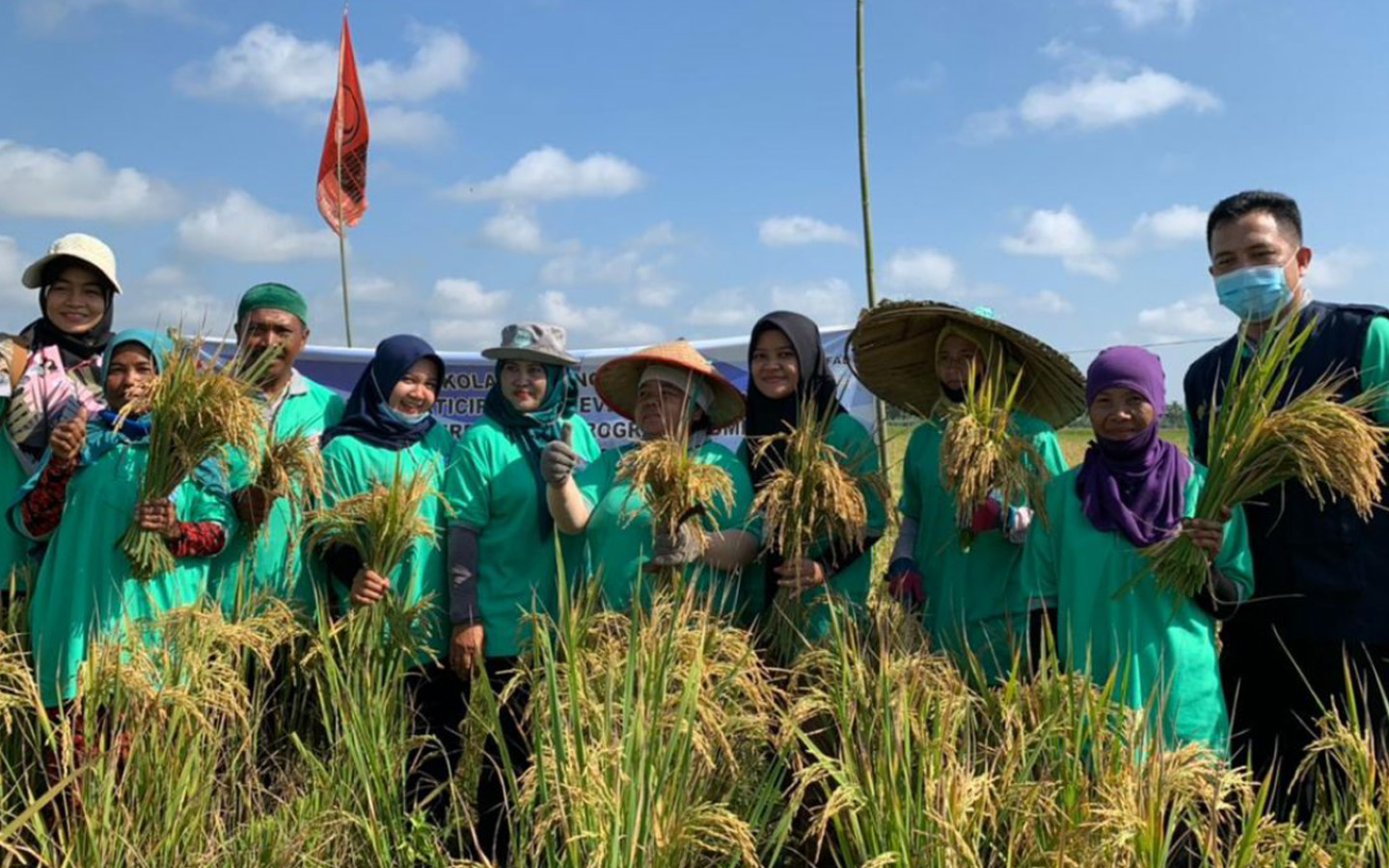More Water for Farmers with Improved Irrigation
Indonesia’s decade-long program to revitalize the country’s irrigation will increase agricultural production, improve farmers’ incomes and livelihoods, and promote rural growth. ADB, the Association of Southeast Asian Nations (ASEAN), and the World Bank are working in harmony to usher in a new era of food security for the country.
Irrigation Reforms
Indonesia’s Irrigation Improvement Program (IIP) 2015–2025 is the government’s response to persistent rural poverty and food security concerns. The countrywide program is rehabilitating irrigation infrastructure to improve the delivery of water services for agricultural production and ensure more efficient management of irrigation systems. It calls for participatory irrigation management—the collective effort of national and local governments, water users associations, and water resources agencies, among other irrigation stakeholders.
Only 55% of Indonesia’s irrigation system was functioning at full capacity, an assessment conducted by the Ministry of Public Works and Housing (MPWH), which oversees irrigation infrastructure, revealed in 2014. Water for agricultural activities was not reaching many farm communities. In 2015, the Directorate General of Water Resources under the MPWH institutionalized reforms put forward by ADB’s Participatory Irrigation Sector Project, completed in 2014, for the sustainable management of water resources and irrigation infrastructure and facilities. The project provided a robust regulatory framework for the management and operations and maintenance of irrigation infrastructure.
The IIP has rehabilitated irrigation systems, inventoried irrigation infrastructure, and established irrigation commissions across the country. Still, implementation gaps remain, among them:
Strengthening institutions and processes, especially at the subnational level, to ensure sufficient budget allocation for routine operation and maintenance
Improving water delivery services to provide the intended level of service and to cope with climate variability
Rehabilitating or upgrading irrigation schemes to improve water efficiency and climate resilience
Improving irrigation services to increase rice yields and crop intensity, provide farmers with an incentive to diversify from low- to high-value crops, increase rural incomes, and enhance food security
Better integration between irrigation and agriculture to adapt to climate risks
Keen to effectively implement its IIP, the Government of Indonesia has sought the help of financing partners to address these gaps and support its ambitious, decade-long program.
Results-based Approach
In May 2017, ADB approved the Indonesia: Integrated Participatory Development and Management of Irrigation Program to support the government in implementing the IIP. Cofinanced with the ASEAN Infrastructure Fund, the program is expected to contribute to rural growth through better water delivery and improving the country’s food security. The World Bank is providing parallel cofinancing.
ADB’s irrigation program for Indonesia comes as a results-based loan, which supports government programs with a performance-based form of financing linking disbursements to results. The loan will finance a time slice (from 2017 to 2024) of the IIP to deliver sustainable and more productive irrigated agriculture in 74 districts. Specifically, it will focus on:
Strengthening systems or processes and institutional capacity for sustainable irrigated agriculture
Improving irrigation operation, maintenance, and management
Improving irrigation infrastructure
ADB’s support for Indonesia’s Irrigation Improvement Program is promoting cooperation and collaboration among a wide variety of irrigation sector stakeholders.
Eric Quincieuprincipal water resources specialist and project officer, ADB
The International Fund for Agricultural Development (IFAD) is providing parallel financing to Indonesia’s Ministry of Agriculture for better delivery of agricultural services to maximize the benefits of the irrigation improvements. IFAD’s support complements the ADB program by addressing underperforming extension services, poor access to financial services, and inefficiencies in the value-chain and cropping patterns that contribute to low farm incomes.
“ADB’s results-based loan for revitalizing irrigation will help Indonesia manage its water and irrigation systems better, delivering critical water to the farm communities that need it,” said Eric Quincieu, ADB principal water resources specialist and project officer.
Toward Better Irrigation
ADB’s Integrated Participatory Development and Management of Irrigation Program for Indonesia is nearing full implementation and has reached several milestones.
Systems and Institutional Capacity. The capacity development framework is updated annually, comprising management components and technical, fiduciary, environmental, and social safeguards to improve the capacity of participating agencies to comply with government regulations and agree on program action plans. Performance indicators of water users associations and irrigation commissions guidelines have been updated.
Operation and maintenance and management. A single log-on platform for irrigation asset management information systems was operationalized by December 2019, allowing for continuous improvements in performance measurement, damage assessments, prioritization of work handling, and cost estimations for maintenance and rehabilitation.
Infrastructure. As of 2023, the IIP has rehabilitated 523,000 hectares of irrigation schemes that ADB has already validated.
“ADB’s support for Indonesia’s Irrigation Improvement Program is bringing together a wide variety of irrigation sector stakeholders—farmers, water users’ associations, government agencies, financing partners, the private sector, and local communities—to deliver more water to farmers, enabling them to increase yield and ultimately improving farmers’ welfare and food security,” Quincieu said.
Cost
$1.7 billion
- ADB Resources $500 million
- Government of Indonesia $1.1 billion
Cofinancing Partners
- ASEAN Infrastructure Fund (Loan) $100 million
- World Bank (Loan) $28 million
Dates
Approval Date 18 May 2017
Signing Date 31 July 2017
Completion Date 30 June 2024


